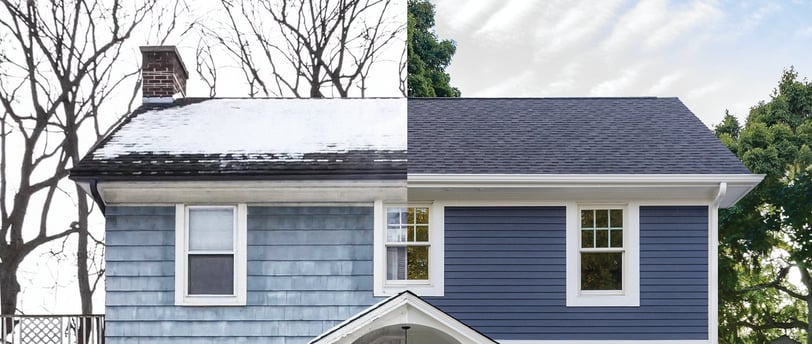7 Warning Signs You Need New Siding & When to Replace It
Your home’s siding does more than enhance curb appeal—it’s the first line of defense against harsh weather, moisture damage, and energy loss. If your siding is old, damaged, or worn out, it can lead to expensive repairs, high energy bills, and even structural issues. But how do you know when it's time to replace your siding? Here are seven major warning signs that indicate it’s time for new siding, plus expert tips on choosing the best materials for Oregon homeowners.
1/27/20253 min read


1. Cracked, Warped, or Loose Siding Panels
If your siding is cracked, warped, or coming loose, it’s no longer protecting your home effectively. These issues often result from years of exposure to rain, wind, and fluctuating temperatures, which break down materials over time.
Why This is a Problem
Cracks and gaps allow moisture to seep behind the siding, leading to mold, mildew, and wood rot.
Warped panels indicate that the material has weakened, often from prolonged water exposure or sun damage.
Loose siding can allow pests like termites, ants, or rodents to nest behind the panels, causing further damage.
🔍 Quick Test: Walk around your home and check for any areas where the siding is pulling away or has visible cracks. If you press on the material and it feels soft or gives way, you likely have water damage underneath that requires immediate attention.
Best Siding Replacement Option
Fiber cement siding (like James Hardie) is highly durable, weather-resistant, and low-maintenance, making it an excellent choice for homeowners in Salem, OR, Portland, OR, and nearby areas.
2. High Energy Bills & Poor Insulation
Have your heating and cooling costs increased unexpectedly? Damaged or outdated siding fails to insulate your home properly, allowing heat to escape in the winter and making your air conditioning work harder in the summer.
Signs Your Siding is Hurting Your Home’s Efficiency
Rooms feel drafty or unusually hot or cold, even with the HVAC running.
Your energy bills are higher compared to previous years.
You notice temperature fluctuations between rooms.
Solution
If your siding is old, cracked, or poorly insulated, upgrading to energy-efficient fiber cement or insulated vinyl siding can:
Improve your home’s insulation
Lower your monthly energy costs
Keep your home comfortable year-round
3. Mold, Mildew, or Fungus Growth on Your Siding
If you see mold, mildew, or green algae growing on your siding, it’s a clear sign of excess moisture buildup—an early warning sign of hidden water damage.
Where to Check for Mold & Moisture Issues
Around siding seams, corners, and window trims
Near gutters and downspouts, where water runoff collects
On the north-facing side of your home, where sunlight exposure is limited
Why You Shouldn’t Ignore This
Mold spreads quickly behind siding, leading to structural rot and expensive repairs.
Excess moisture can cause wood decay, weakening your home’s framing.
Mold and mildew pose serious health risks to your family, triggering allergies and respiratory issues.
If you notice widespread mold growth, schedule an inspection immediately to prevent further damage.
4. Peeling Paint & Bubbling Wallpaper Inside Your Home
If your interior walls show signs of peeling paint, bubbling wallpaper, or water stains, your siding is likely failing to keep moisture out.
Why This Happens
Water leaks behind your siding, leading to moisture buildup inside your walls.
The siding’s protective barrier has deteriorated, allowing rain and humidity to penetrate.
Why You Should Act Fast
Interior moisture can cause mold growth, drywall damage, and structural decay.
The longer you wait, the more expensive the repairs will be.
Water damage can compromise the strength of your home’s framework.
If you notice these warning signs, schedule a siding inspection immediately to prevent major home damage.
5. Rotting or Soft Spots in Siding
If you press on your siding and it feels soft, crumbles, or breaks apart, you have a major structural problem that requires immediate attention.
Why Rotting Siding is Dangerous
Rot can spread to the wooden frame of your home, weakening its structure.
It creates an entry point for pests like termites and carpenter ants.
Once rot sets in, repairs are no longer an option—a full siding replacement is necessary.
Best Siding Choice for Oregon’s Climate
Fiber cement siding is rot-resistant, pest-resistant, and highly durable—making it one of the best siding options for homes in Salem, OR, Portland, OR, and surrounding areas.
📞 Get a Free Siding Inspection in Salem & Portland!
If you’ve noticed any of these signs, don’t wait for further damage to occur. At 503 Construction, we specialize in siding replacements, fiber cement installation, and siding repairs in Salem, OR, Portland, OR, and surrounding areas.
✅ Free estimates & inspections
✅ Top-rated siding materials like James Hardie fiber cement
✅ High-quality installation & expert craftsmanship
👉 Call us today at (503)983-5422 or request a free siding inspection here.
Renovation
Transforming homes with trusted and expert service.
Service
8215 SW Tualatin-Sherwood Road, Suite 200, Tualatin, OR 97062
503 Construction LLC
(503)-983-5422
© 2024. All rights reserved.
